On November 25-29, the Internet Governance Forum 2019 was held in Berlin, Germany, bringing together multiple stakeholders to discuss public policies and digital rights. Professor Luca Belli, coordinator of CyberBRICS Project, Ivar Hartmann, coordinator at Centro de Tecnologia e Sociedade (CTS/FGV) and Yasmin Curzi, researcher at CTS/FGV attended several sessions, sharing their opinions and discussing the latest results of their research.
The CyberBRICS Twitter Account (@BricsCyber) was recognised as one of the most influential commentators of the event on Twitter for the real-time coverage of six IGF sessions featuring our team’s participation.
Check the summary and the full videos of the sessions below:
DAY 0 (Nov 25):
Internet Commons Forum was jointly organised by FGV, ISOC, APC and Centrum Cyfrowe and aimed at gathering thinkers and doers that are developing ideas and solutions for a less concentrated and more just Internet. This event gathered key stakeholders exposed their views works aimed at fostering the idea of an Internet Commons. Four dimensions were explored: Infrastructure, Applications and Platforms, Content and Data, Policy and Governance.
For more information about the event, visit the website: http://www.intcomforum.org/
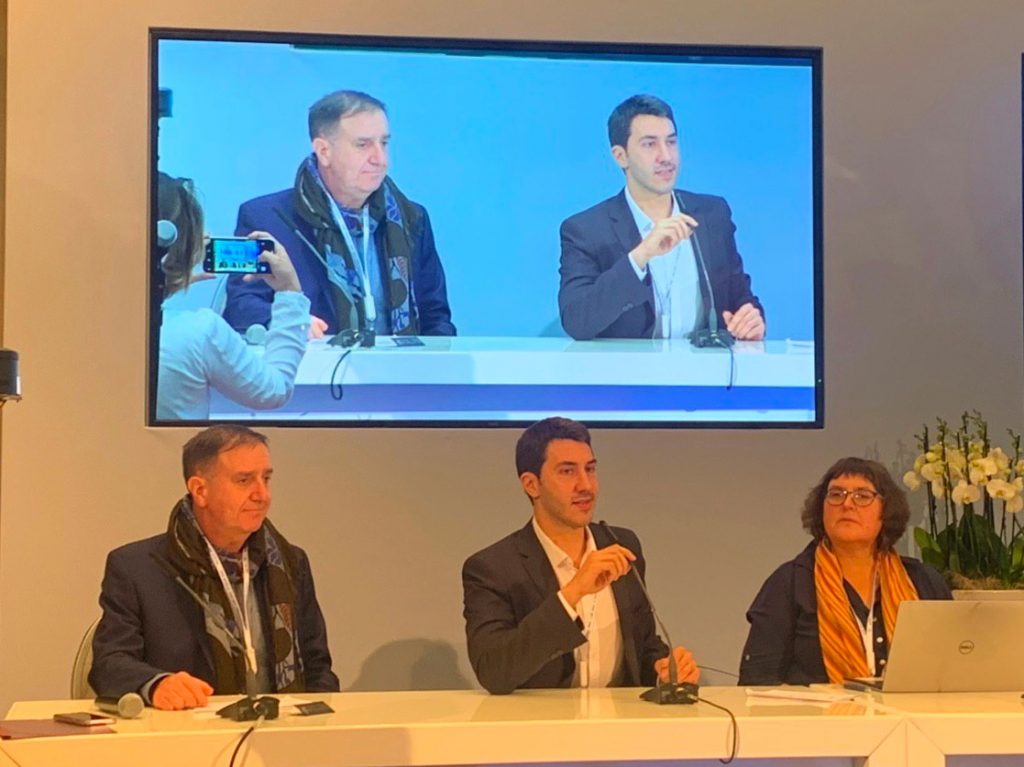
Speakers:
- Luca Belli
- Adam Burns, Free2Air
- Sophie Bloemen, Commons Network
- Cade Diehm, Info Activism
- Jane Coffin, ISOC
- Carlos Baca, Rhizomatica
- Nico Pace, LibreRouter
- Mathias Judd, Qaul Net
- Mariana Valente, Creative Commons
- Anita Gurumurthy, IT for Change (TBC)
- Paul-Olivier Dehaye, PersonalData.IO
- Markus Beckedahl, Netzpolitik.org
- Alek Tarkowski, Centrum Cyfrowe
Highlights:
“If we want to give people hope, we need to consolidate the initiatives we mention today, and strive to bring younger generations into this topic and make it more visible.”
Luca Belli
“We’re using software to create a common space, we’re not building a story, we’re building the space to mobilize people to discuss this topic.”
Paul-Olivier Dehaye, from PersonalData.IO
Full session:
DAY 1 (Nov 26):
5G, IoT and Zero Rating Challenges for Net Neutrality: this panel aimed at exploring the impact of the most recent technological and commercial developments in users’ capability to freely access and share information and innovation.
Importantly, the 2019 Dynamic Coalition on Net Neutrality (DCNN) outcome, the Zero Rating website, has been officially presented and discussed. Visit the website: http://www.zerorating.info/

Speakers:
- Luca Belli, FGV Law School
- Edison Lanza, Organization of American States Rapporteur for Freedom of Expression
- Frode Sorensen, Nkom (Norwegian Telecoms Regulator)
- Aurore Tual, ARCEP (French Telecoms Regulator)
- Bob Frankston, IEEE Consumer Electronics
- Veronica Arroyo, Access Now
- KS Park, Korea University Law School
- Thomas Lohninger, Epicenter.works
Highlights:
“We should start to understand concerns about democracy and economy as intimately intertwined. Lack of competition is a threat to democracy.”
Luca Belli
“We only consider zero rating from the perspective of the recipient (…) but the great question should be ‘is the content and access really free?’. If you receive something free from a for-profit corporation, its quite hard to believe that it is completely free.”
Luca Belli
Full video:
DAY 2 (Nov 27):
Technological Innovation and Challenges to Data Governance: this session aimed to explore the impact of data governance policies and trends on the development of new technologies across the globe, the international rules making on data governance and new technologies and also the relationship, role and position of the public and private sector in data governance mechanism.
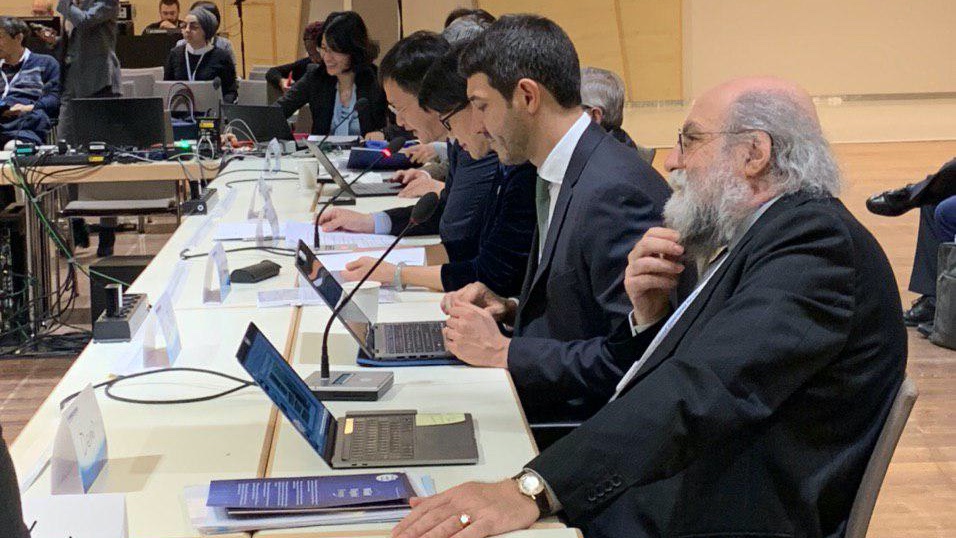
Speakers:
- Li Yuxiao, vice President of Chinese Academy of Cyberspace Studies
- Qi Xiaoxia, Bureau of International Cooperation, Cyberspace Administration of China
- Louis Pouzin, father of France Internet
- Hong Yanqing, Senior Researcher at Law and Development Academy at Peking University
- Luca Belli, FGV, Brazil
- Henry Gao, Associate Professor of Law, Singapore Management University
- Zhangxiao, deputy director of the CNNIC
Highlights:
“Frameworks for data protection are relevant not only because they provide new rights and a stable, legal framework for individuals, but also incredible trust for business.”
Luca Belli
Full video:
Public Interest Data: Where Are We? To Do What? This workshop aimed at answering questions about Public Interest Data which right now are at the center of the issues of the data economy and data governance. The panel proposed contributions to a framework for a common data space, for the opening of personal data collected by dominant players while protecting individuals.
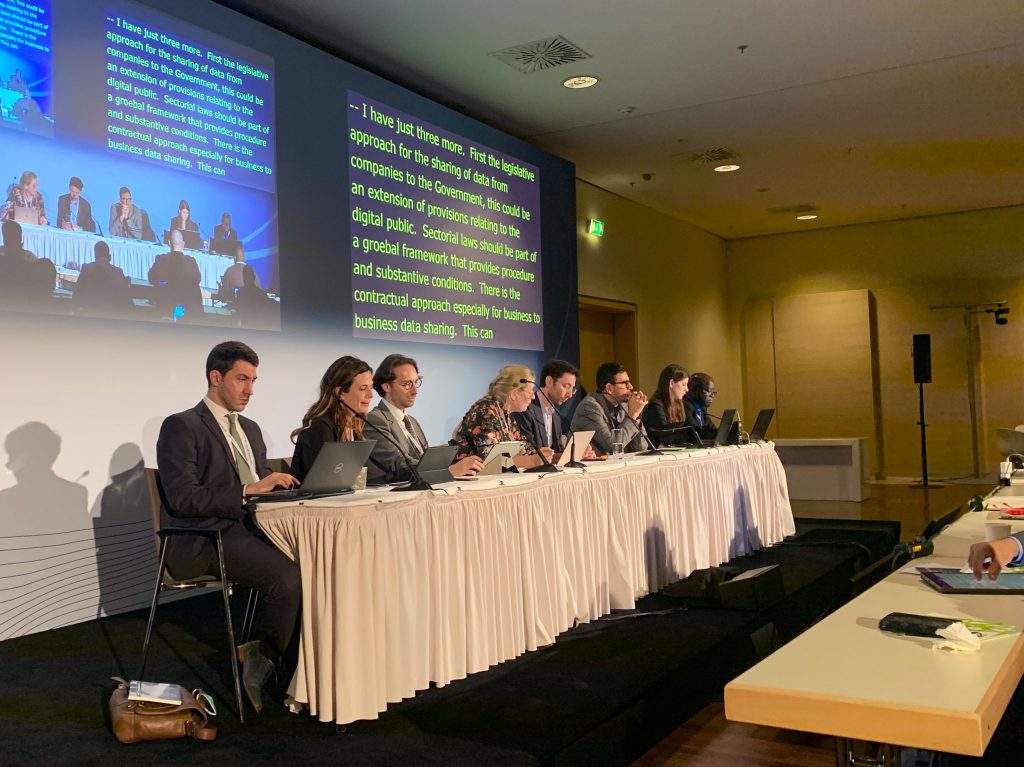
Speakers:
- Carolyn Nguyen, Private Sector, Western European and Others Group
- Chérif Diallo, Government, African Group
- Sebastien Soriano, Government, Western European and Others Group
- Luca Belli, Civil Society, Latin American and Caribbean Group
- Lucien M. CASTEX, Technical Community, Western European and Others Group WEOG)
- Annie Blandin, French Digital Council – Conseil national du numérique CNNum
- Laurent Cytermann, Government, Western European and Others Group Francesca Bria, Government, Western European and Others Group
Highlights:
“We are moving from regulating with data to making effective public policies with data […] Citizens can choose with whom they want to share their data […] This enables data sharing while protecting rights.”
Francesca Bria
Full session:
Platform Values: Conflicting Rights, AI & Tax Avoidance: this panel was organised by Nicolo Zingales and Luca Belli. This session discussed how platforms convey and extract values. The session also included the presentation of the special issue of the “Computer Law & Security Review”, dedicated to Platform Values: Conflicting Rights, Artificial Inteligence and Tax Avoidance, which is the 2019 official outcome of the coalition. All the articles are available right here.
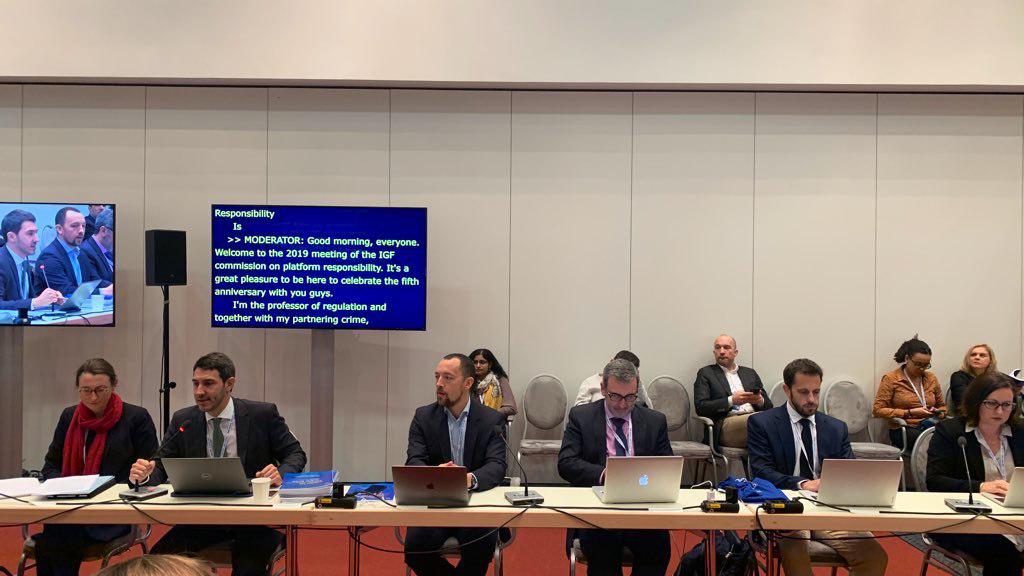
Speakers
- Edison Lanza, Special Rapporteur for Freedom of Expression Organization of American States
- Nic Suzor, Queensland University of Technology
- Monica Rosina, Facebook
- Chris Marsden, University of Sussex
- Ivar Hartmann, FGV
- Giovanni De Gregorio, Univerista’ Milano Bicocca
- Dragana Obradovic, Balkan Investigative Reporting Network
- Catherine Carnovale, Elsevier
- Rolf H. Weber, University of Zurich
- Catalina Goanta, Maastricht University
- Yseult Marique, University of Essex
Highlights:
“We should consider state regulation that is less about merits of individual instances of speech and more about protection of procedural rules.”
Ivar Hartmann
“it’s time to move from a negative to a positive dimension of the right to freedom of expression.”
Giovanni Di Gregorio
Full session:
Video not available yet.
Value and Regulation of Personal Data in the BRICS: the session was focused on the attitudes of BRICS countries for the regulation and governance of Internet from the perspective of data protection. The workshop explored how personal data are regulated in Brazil, China, India, Russia and South Africa, where the “next billion Internet users” live.
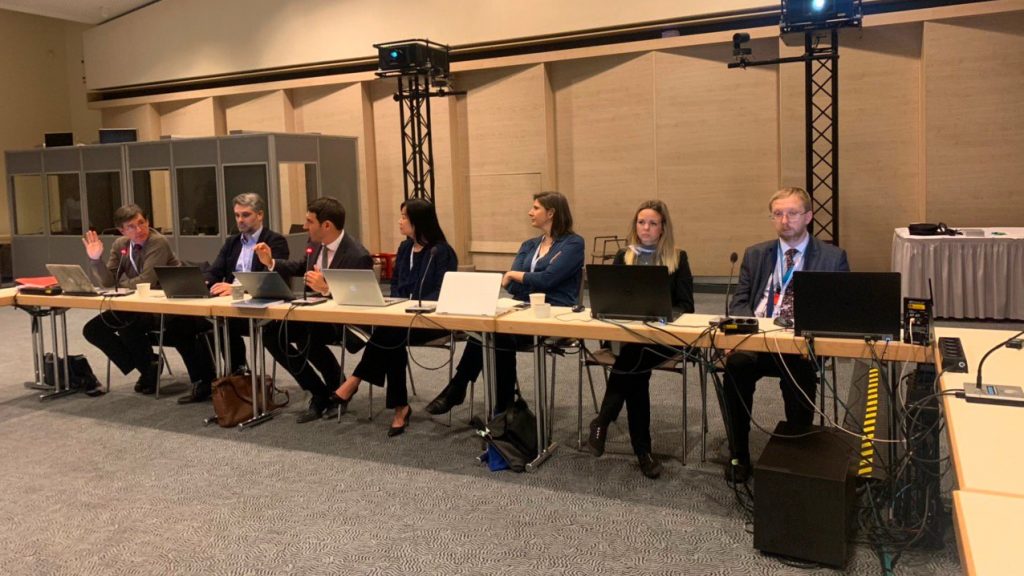
Speakers:
- Anja Kovacs, Civil Society, Asia-Pacific Group
- Dirk Delmartino, Private Sector, African Group
- Sagwadi Mabunda, Civil Society, African Group
- Andrey Shcherbovich, Civil Society, Eastern European Group
- Achilles Zaular, Government, Latin American and Caribbean Group
- Min Jiang, Civil Society, Asia-Pacific Group
- Sophie Kwasny, Intergovernmental Organization, Western European and Others Group
- Luca Belli, Civil Society, Latin American and Caribbean Group
Highlights:
“What we’re seeing now is a new ‘sputnik’ moment between China and the #US around #AI and #5G and accelerating a technological de-coupling of the two countries.”
Min Jiang
“Personal data should not be collected for longer than its purpose requires.”
Andrey Shcherbovich
Full session:
DAY 03 (Nov 28):
Community Networks: Policy and Regulations: Over the past 4 years, the Dynamic Coalition on Community Connectivity (DC3) has successfully demonstrated that Community Networks (CNs) are feasible options to expand connectivity and that the communities behind CNs are reliable partners. Besides the research demonstrating the feasibility and interest of CNs and instructions on how to build them.
The book on “Building #Community Network Policies: A Collaborative Governance towards Enabling Frameworks” was released at the session.
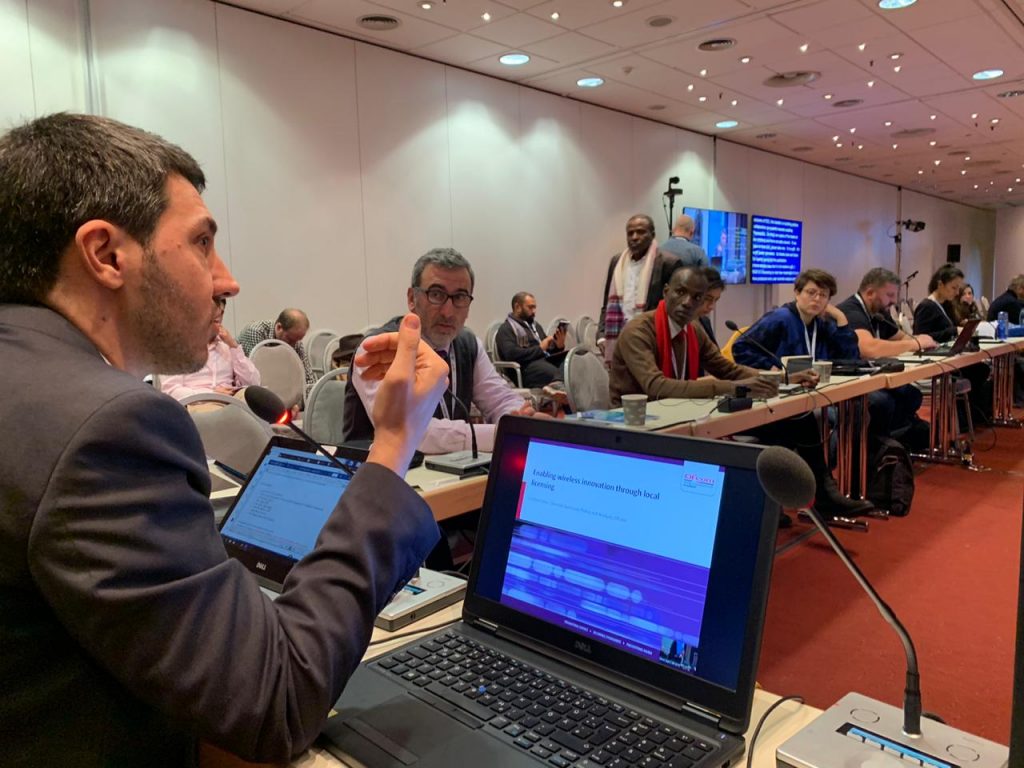
Speakers:
- Luca Belli, FGV Law School
- Edison Lanza, Organization of American States Rapporteur for Freedom of Expression
- Cristina Data, Ofcom
- Jane Coffin, ISOC
- Carlos Baca, Rhizomatica
- Carlos Rey-Moreno, APC
- Adam Burns, Free2Air
- Julie Owono, Internet Sans Frontières
“We need to hear more from the public but we also need to hear more from the public regulators. There is scope for change.”
Carlos Rey Moreno
“Community networks drive affordable and high quality connectivity.”
Luca Belli
Full session:

